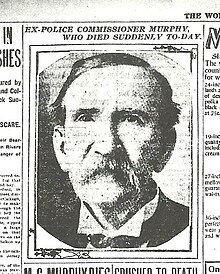Michael C. Murphy (politician)
| Michael Cotter Murphy | |
|---|---|
 |
|
| 1st New York City Police Commissioner | |
|
In office February 22, 1901 – January 1, 1902 |
|
| Succeeded by | John Nelson Partridge |
| Member of the New York State Assembly from the New York County, 1st district |
|
|
In office January 1, 1867 – December 31, 1870 |
|
| Preceded by | William Minor |
| Succeeded by | Michael Madigan |
| Member of the New York State Assembly from the New York County, 1st district |
|
|
In office January 1, 1881 – December 31, 1883 |
|
| Preceded by | James Fitzgerald |
| Succeeded by | Patrick H. Duffy |
| Member of the New York Senate from the 5th district |
|
|
In office January 1, 1884 – December 31, 1889 |
|
| Preceded by | John G. Boyd |
| Succeeded by | William L. Brown |
| Personal details | |
| Born |
March 7, 1839 Kilmallock, County Limerick, Ireland |
| Died | March 4, 1903 (aged 63) New York City, New York |
Michael Cotter Murphy (March 7, 1839 – March 4, 1903) was an American politician from New York, and a recipient of the Medal of Honor during the American Civil War. He was the first New York City Police Commissioner.
The family emigrated to the United States in 1848. He attended the common schools in New York City and then became a compositor.
Murphy was commissioned as a captain of the 11th New York Infantry (Fire Zouaves) in May 1861, and served with the regiment until transferring to the 170th New York Infantry in July 1862. He was promoted to lieutenant colonel of the 170th New York Infantry in February 1863. For actions while commanding his regiment during the Battle of North Anna, he was later awarded the Medal of Honor. The following month, he was dismissed due to disability. In 1866, he was a general of the Fenian Army which prepared to take part in the Fenian raids on Canada.
Murphy was a member of the New York State Assembly (New York County, 1st D.) in 1867, 1868, 1869 and 1870. In 1870, he was charged with bigamy and was absent from the Legislature for most of the session.
...
Wikipedia
